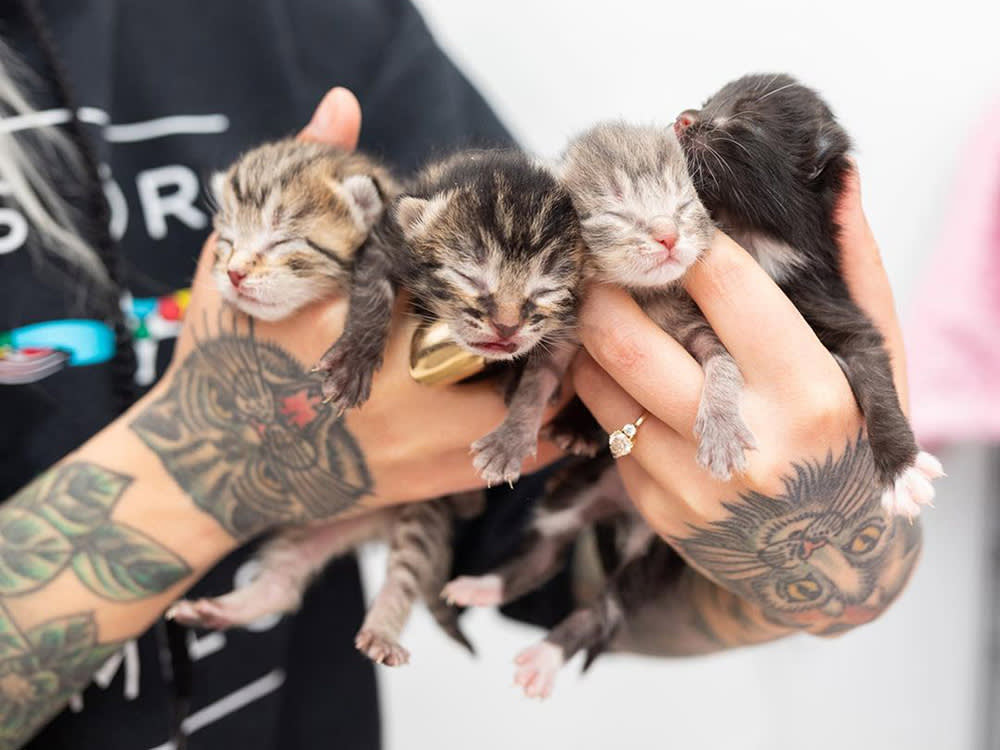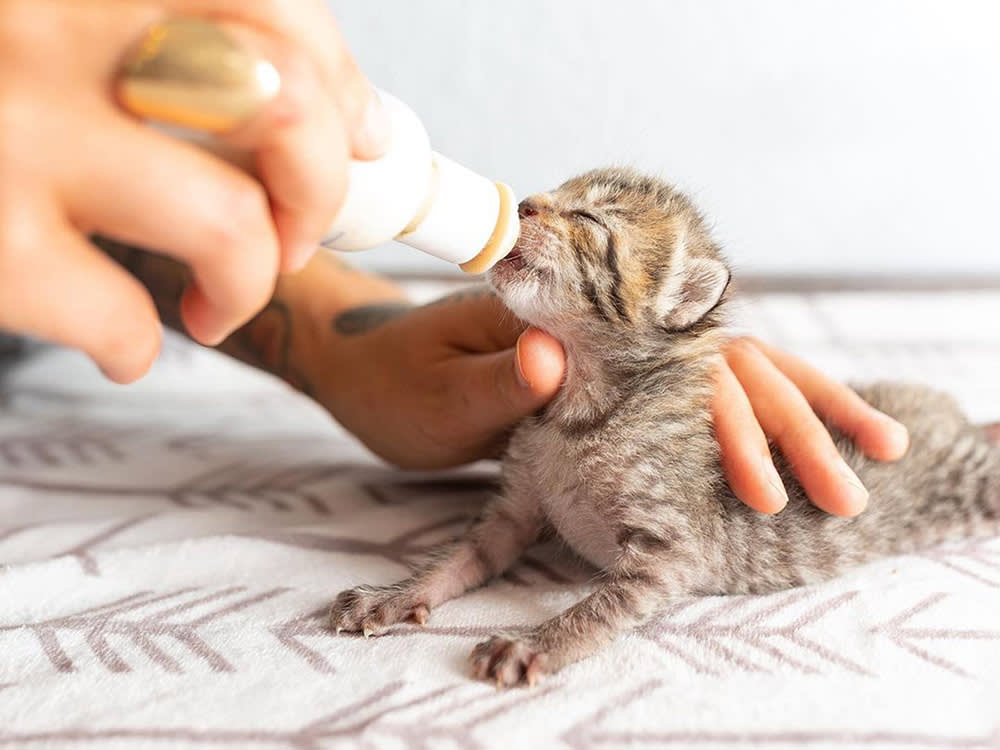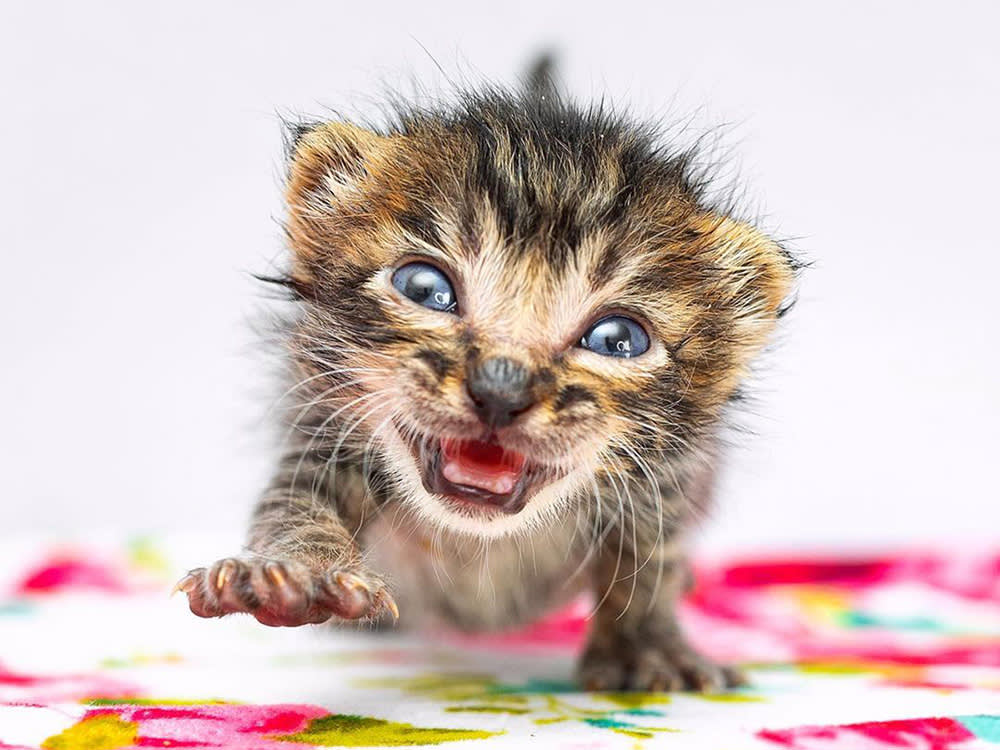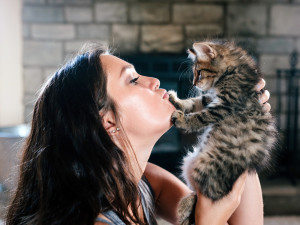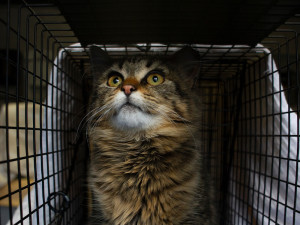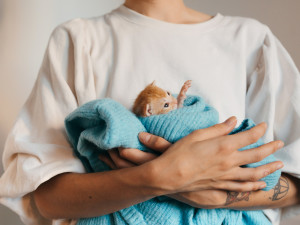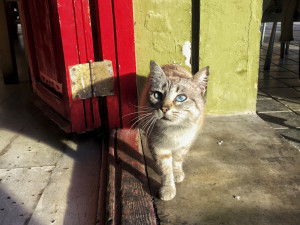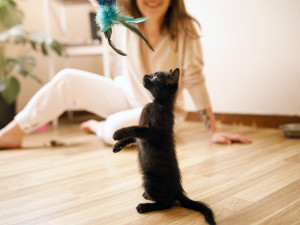Heads Up: It’s Officially “Kitten Season”
Hannah Shaw, aka Kitten Lady, on how you can care for orphaned kittens this spring.
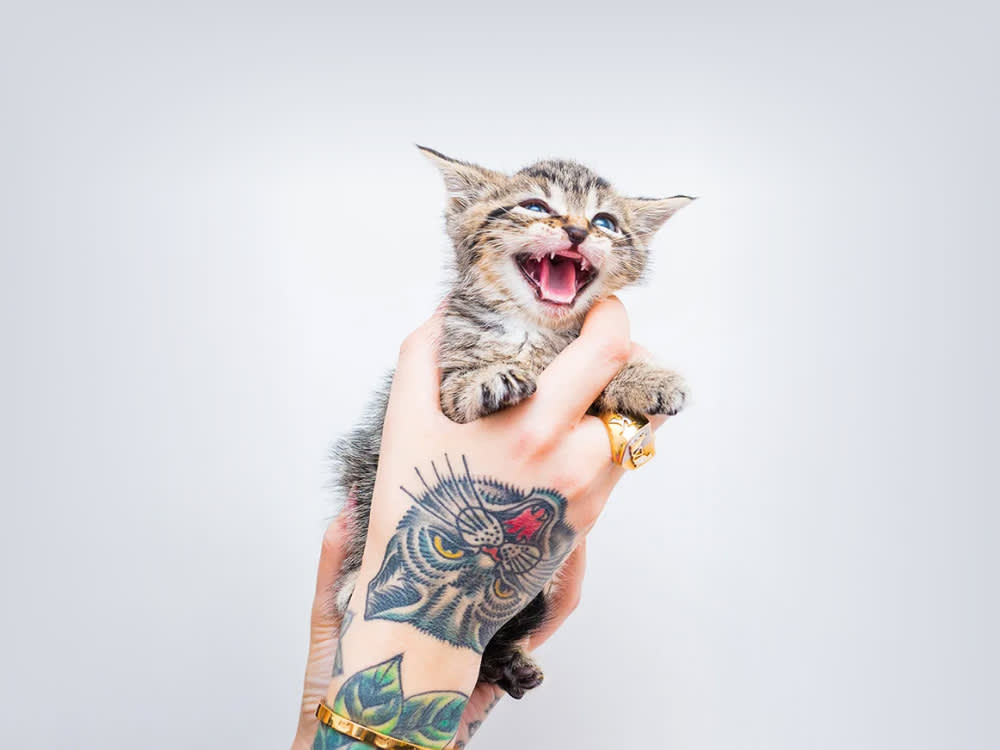
Share Article
Across much of the Northern Hemisphere, spring is poking its head over the horizon. Snow is melting, flowers are blooming, and wild animals are doing what wild animals do best — making more animals. Or, if you were a Disney movie kid, you might first have heard it described by Bambi as “getting twitterpated.”
If you are in the animal-rescue field, though, you might know this time of year as something else: “kitten season.” This time of year, vets, shelters, and independent rescue organizations are gearing up for a massive influx of stray cat litters. And they need all the help they can get.
We chatted with Hannah Shaw , aka Kitten Ladyopens in new tab, an expert on looking after kittens (and puppies and piglets), about how people can help during this fruitful time of year. Shaw has rescued and rehabilitatedopens in new tab hundreds of newborn, often orphaned kittens who are too young and vulnerable to survive in an animal shelter (and who are thus euthanized if someone like her doesn’t step up to nurse them back to health). She is also a humane educator and New York Times bestselling author who hosts workshops to teach people how to help their community cats.
What is “kitten season?”
“Kitten season” is a label for the warmer months of the year, when most cats have their litters. As the weather improves, it’s safer for animals to have babies. Generally speaking, kitten season runs from March to October, but this can vary based on local conditions. In states where the weather is more universally temperate, you may see litters coming in at all times of year, but even in these places, kitten season marks a huge spike in the number of births.

According to the ASPCAopens in new tab, 90 percent of the kittens who come into shelters in LA do so during kitten season, and in New York City that number is around 84 percent — by far the majority of the animals who come through their doors. Shaw says that the vast majority of cats who enter shelters are from feral outdoor births.
“Eighty percent of kittens born in the United States every year are born outdoors on our community streets. A higher percentage than that is in our animal shelters — the vast majority of kittens in animal shelters are brought in by everyday people [who found] them outside.”
How can I help during kitten season?
There are many ways to help during kitten season, as there’s no one-size-fits-all fix to the problem. Depending on your availability, there are a number of ways you can lend a hand.
Foster a kitten
Perhaps the most pressing demand is for people to foster very young kittens. Kittens under eight weeks old require specialized care that many shelters simply don’t have the round-the-clock resources to provide, including bottle-feeding, weaning, and routine cleaning. By fostering — and hopefully finding them homes when they’re ready to be adopted — you’ll be helping with “intake diversion,” essentially avoiding the shelter system altogether.
“Intake diversion for kittens means educating the community about what to do if you find a kitten outside,” Shaw says. “The kittens who are entering the shelter ideally should only be kittens who have no other option. The better thing is to prevent them from coming into the shelter, either through them never being born because we’re doing trap-neuter-return (TNR) in our communities and community cats are receiving spay/neuter services, or because we’re empowering community members to take on the care of those kittens themselves.”
Get involved with your local TNR program
If you’re interested in helping at a more systemic level, get involved with your local TNR organization. They work to spay/neuter and vaccinate feral cats, then return them to the local cat population. Many, such as Flatbush Cats in Brooklyn, NYC, host workshops on how to safety trap, neuter, return, and keep tabs on your community cat colonies.
Volunteer with or donate to your local shelter
Your local shelters and foster programs could also use direct assistance. As nonprofits, they will accept tax-deductible monetary donations, if you’re able. Most will also allow you to donate supplies directly. Orphan Kitten Clubopens in new tab, the nonprofit organization Shaw founded, has Amazonopens in new tab and Chewy Wish Listopens in new tab s set up for your convenience. “I think familiarizing yourself with the kitten rescue landscape in your community will help,” Shaw says. “You can share adoptable animals to help them find homes, you can donate supplies, you can help transport — there are a lot of different ways people can volunteer.”
What should I do if I find a kitten outside?
With all these kittens being born outdoors, it can be hard to know what to do if you stumble upon a litter. It’s not always the right thing to do to just grab the babies and rush to your nearest shelter. It depends on the situation in which you find them, as well as a few other factors.
“Everybody wants a quick and easy answer to the question, ‘What do you do if you find a kitten outside?’” Shaw says. “But the reality is there’s not a quick and easy answer to that question because no two situations are the same.” So, Shaw developed the CASA method as a way of figuring out if you should bring a kitten home or not. “The idea is that if you find a kitten outside, you ask yourself, do I take this kitten into my CASA?” Here are the four things you have to ask yourself:
Condition
“If the kitten is in good shape, they have likely been cared for by their mother recently,” notes Shaw in her CASA guideopens in new tab. “In ‘good condition’ means the kitten is clean and alert, chunky and well-fed, and not in distress. Mom is likely around the corner, so try your best to reunite them if they are unweaned. In ‘bad condition’ would mean the kitten is dirty or covered in waste, visibly underweight, or in distress (or worse, is having a health crisis). This kitten may truly be orphaned and needs swift intervention!”
Age
“A kitten’s age will help you determine the right course of action: Kittens under five weeks old are uncoordinated, have closed or baby-blue eyes, and are unweaned (dependent on their mother for nursing). These kittens should be kept with mom, either by trapping the family for foster care or by leaving them with their mother until they’re weaned. Kittens between five and 12 weeks old are playful and coordinated, able to walk and run, and are eating food independently.”
Shaw notes that they are at the ideal age to be rescued and socialized, making them prime candidates for adoption. Older kittens (more than 12 weeks old) are no longer nursing and typically have proportionate, lanky bodies. “If feral, these kittens will be more difficult to socialize,” so they may be better candidates for TNR.
Situation
“Every situation will be different, and it’s up to you to use your best judgment about when and how to intervene,” Shaw says. Is the mother cat (or a cat colony caregiver) present? Do they have food? Are they sheltered from the elements? If not, you may need to intervene.
Ability
Last but not least, “Your abilities and access to community resources will factor into how you respond. Give the kitten the most positive outcome possible — while working within your means and capacity.” Ask yourself: Can you or someone you know foster the kitten(s)? Does your local shelter have a neonatal kitten program that can help? Can you access other resources, such as spay/neuter services, in your community?
“It’s much easier to foster when you have the mom,” Shaw emphasizes. “It’s better for the kittens, too. So, if they’re under five weeks old, then we wanna try to keep them with mom because they are dependent on nursing.” If you’re able to trap the entire family, the mother cat can be spayed, immunized, and then reintroduced to the kittens, so that the natural process of kitten rearing can happen.
It goes without saying that kitten season puts a lot of stress on animal welfare and veterinary services. Luckily, there’s a lot that you can do to help in your community. We’ll leave you with this adorable video of one of her foster kittensopens in new tab, Chouchou, who Shaw saved at just five days old.

Tim Barribeau
Tim Barribeau is a freelance writer, editor, cat dad, and “help your boyfriend buy a suit that actually fits for once” consultant. He was previously the Style and Pets editor at Wirecutter, and has bylines at a bunch of publications that don't exist anymore (and a couple that still do).
Related articles
![Woman holding brown kitten to her face.]()
8 Myths About Your Kitten—Busted By a Behaviorist
Forget everything you think you know about baby cats.
![A fluffy red-brown cat in a crate]()
How Flatbush Cats Is Saving Brooklyn’s Strays
Ad agency strategist Will Zweigart founded a nonprofit to tackle the neighborhood’s street cat epidemic.
![anonymous woman pampering and taking care about a small ginger kitten]()
6 Ways to Help Local Shelters Without Committing to Full-Time Pet Parenthood
Learn how you can be there for animals in need this National Pet Day.
![A kitten laying on a persons lap with their paws in the air.]()
6 Things to Know Before Fostering a Cat
Ready to make a difference in a kitten’s life?
![A cat with blue eyes standing before a door entrance.]()
How TNR Is Helping Outdoor Cats
Trap-Neuter-Return is the most humane way to keep stray cat populations in check. Here’s how it works.
![Woman playing with a black kitten.]()
5 Kitten Behavioral Milestones You Should Know
Keep track of all their fun phases with these guidelines.

